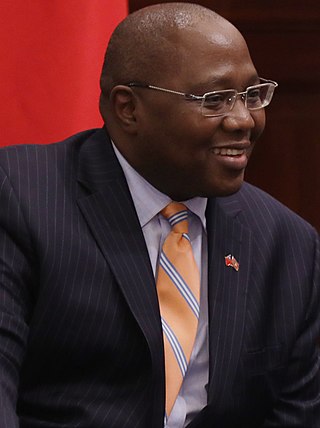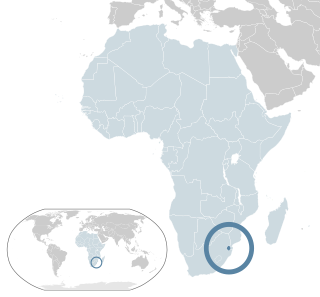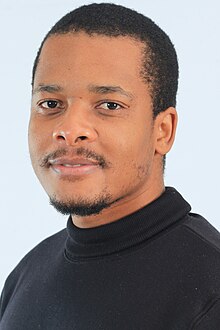
Eswatini, formally the Kingdom of Eswatini and also known by its former official name Swaziland and formerly the Kingdom of Swaziland, is a landlocked country in Southern Africa. It is bordered by Mozambique to its northeast and South Africa to its north, west, south, and southeast. At no more than 200 km (120 mi) north to south and 130 km (81 mi) east to west, Eswatini is one of the smallest countries in Africa; despite this, its climate and topography are diverse, ranging from a cool and mountainous highveld to a hot and dry lowveld.

Mbabane is the most populous city in Eswatini, and is one of the two capitals, serving as the executive capital.

Mswati III is Ngwenyama (King) of Eswatini and head of the Swazi royal family. He heads Africa’s last absolute monarchy, as he has veto power over all branches of government and is constitutionally immune from prosecution.

Hhohho is a region of Eswatini, located in the north western part of the country. Hhohho was named after the capital of King Mswati II, who expanded the Swazi territory to the north and west, taking in the districts of Barberton, Nelspruit, Carolina and Piet Retief. These areas were later acquired by what was the Province of Transvaal and today they form part of the Mpumalanga Province of South Africa. It has an area of 3,625.17 km², a population of 320,651 (2017), and is divided into 14 tinkhundla. The administrative center is the national capital of Mbabane. It borders Lubombo Region on the southeast and Manzini Region in the southwest.

The Swazi or Swati are a Bantu ethnic group native to Southern Africa, inhabiting Eswatini, a sovereign kingdom in Southern Africa, and South Africa's Mpumalanga province. EmaSwati are part of the Nguni-language speaking peoples whose origins can be traced through archaeology to East Africa where similar traditions, beliefs and cultural practices are found.

Royal Swazi National Airways Corporation was the national airline of the Kingdom of Swaziland. Headquartered in Mbabane with its operational base at Matsapha Airport near Manzini, the airline was founded in 1978. The company still exists, since 2018 under the name Royal Eswatini National Airways Corporation (RENAC), although it does not own an airline, but provides services in the airline sector.

Lobamba is a city in Eswatini, and is one of the two capitals, serving as the legislative, traditional, spiritual, seat of government of the Parliament of Eswatini, and Ludzidzini Royal Village, the residence of Queen Ntfombi, the Queen Mother.
Mbandzeni was the King of Swaziland from 1872 until 1889. Ingwenyama Mbandzeni was the son of Mswati II and Nandzi Nkambule. His mother the wife of King Mswati had died when he was still very young.
Eswatini Posts and Telecommunications Corporation is an Eswatini (Swaziland) company that provides the two services under one corporate umbrella. The company, known as EPTC, is divided into four units: Eswatini Post, Eswatini Telecom, PhutfumaniCouriers and National Contact Centre (NCC). The EPTC is a parastatal company and is responsible to the Ministry of Information, Communications and Technology. Eswatini Mobile and MTN Eswatini, a subsidiary of MTN Telecom in South Africa, are competitors to the company.
Felix Gerson Badenhorst is a Liswati professional footballer who currently plays for Royal Leopards F.C. of the Premier League of Eswatini.

Riovic Capital Group, or simply Riovic, is a financial technology and investment company that specializes in emerging technologies.

Ambrose Mandvulo Dlamini was a Swazi business executive who served as the tenth prime minister of Eswatini, holding the office from October 2018 until his death on 13 December 2020.

The Royal Science and Technology Park (RSTP) is a Swazi public enterprise and science park created to foster the conception of inventions and facilitate their patenting and help knit various elements of the R&D cluster together. It is intended to provide a focal point for research, facilitate the links between research and industrial communities and stimulate the development of knowledge-based businesses by incubating techno-partnership and high-tech enterprises.

The history of the Jews of Eswatini, formerly Swaziland.

The Sive Siyinqaba National Movement is a political party in Eswatini. It is led Ngomuyayona Gamedze as of 5 November 2022 as president, taking over from former Minister of Tourism Musa Nkambule and calls for a constitutional monarchy as a replacement for the absolute monarchy currently in place in Eswatini. Sive Siyinqaba National Movement also calls for a government by the people, for the people. The party's official colors blue and yellow stand for peace and wealth.
Muzi Tsabedze is a Liswati footballer who plays as a forward for Manzini Sea Birds and the Eswatini national team.

Cybatar is a technology company of the full cycle specialized in cloud-based technology platforms and software.
A series of protests in Eswatini against the absolute monarchy and for democratisation began in late June 2021. Starting as a peaceful protest on 20 June, they escalated after 25 June into violence and looting over the weekend when the government took a hardline stance against the demonstrations and prohibited the delivery of petitions. Lower-level unrest and protests continued until summer 2023.
Leon Manyisa is a Liswati footballer who plays for Premier League of Eswatini club Mbabane Swallows and the Eswatini national team.

Eswatini nationality law is regulated by the Constitution of Eswatini, as amended; the Swaziland Citizenship Act, and its revisions; and various international agreements to which the country is a signatory. These laws determine who is, or is eligible to be, a national of Eswatini. The legal means to acquire nationality, formal legal membership in a nation, differ from the domestic relationship of rights and obligations between a national and the nation, known as citizenship. Nationality describes the relationship of an individual to the state under international law, whereas citizenship is the domestic relationship of an individual within the nation. Eswatini nationality is typically obtained under the principle of jus soli, i.e. by birth in Eswatini, or jus sanguinis, born to parents with Eswatini nationality. It can be granted to persons with an affiliation to the country, or to a permanent resident who has lived in the country for a given period of time through naturalisation or the traditional khonta system.

















